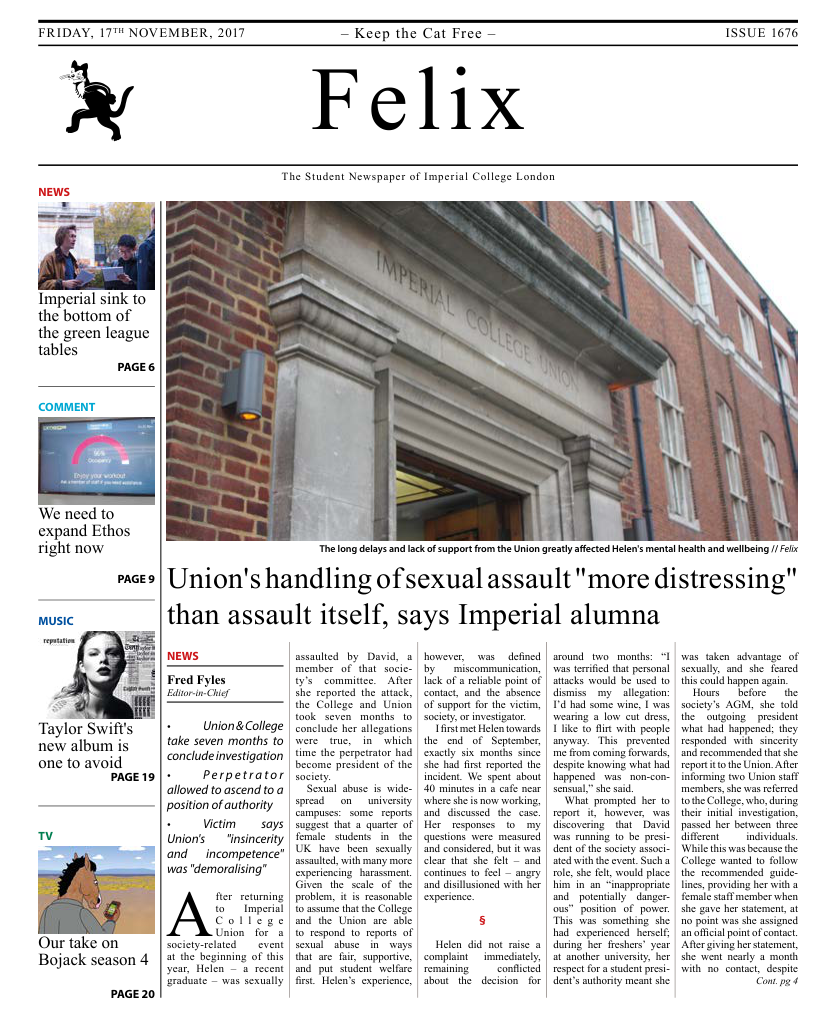Wait – you can be happy and healthy at Imperial?!
It’s Self-Care Awareness Week! Take some time out of your day to recognise the importance of self-care, and look at how you can include some in your life.

Woohoo it’s self-care awareness week! I hope you’re as excited about that as I am! No? Okay – well keep reading and see how you feel at the end.
When I first became RCSU Welfare Officer (aka ‘The RCSU Condom Guy’), I wanted to put self-care on my agenda from the off. It’s something I don’t feel is encouraged much on campus; there is plenty of information and dissemination of services to help us when things go wrong, but nowhere near enough about how to stop things happening in the first place. But what does self-care actually mean? The idea is, surprisingly enough, how to care for yourself: how to keep mentally and physically healthy, and knowing when to seek help for something you cannot deal with yourself. There are two main strands of self-care. Firstly, it’s stopping problems before they start – healthy daily and lifestyle choices will help do this, as well as addressing problems before they develop too far. Secondly, it’s empowering us with the knowledge and confidence to deal with minor ailments ourselves, where possible, since this is inevitably quicker and more personal, and reduces the strain on health services.
A lot of self-care is common sense, really, but it is worth reminding ourselves of it, and to explicitly spend time thinking about our own self-care methods. It is all quite personal, and different things will work for different people, but here are some things I’d suggest:
Health
Disclaimer: not a doctor. (FREMULON!)
· Probably the most obvious thing I’ll say: keep active. Be it just walking to and from campus everyday (unless you live in Beit, in which case that certainly does not count), or having some focussed exercise time. Find what works best for you and your timetable, but don’t overdo it! Recognise you have your limits.
· Eat healthily: another super obvious one. Healthy eating isn’t about restricting what you eat, it’s about balance and enjoyment! We’re all basically scientists here, so experiment. Play around with your diet and find what makes you feel better. Our bodies all react very differently to different foods, so there is no one-size-fits-all diet.
· Sleep: get enough quality sleep. While there’s no fixed amount for everyone, generally, having uninterrupted sleep, in a settled location (i.e. your bed) for a sufficient amount of time will lead to greater daytime energy levels, productivity, and emotional stability (which is nice to have every so often.)
· Pharmacists ≠ just cashiers: did you know you have to have a full degree to become a pharmacist? They are trained to give advice on minor ailments and everyday health issues, but are criminally underused. Next time you have a cold, or an ache, or similar, consider going to your local Boots and talking to someone there (they also have an amazing meal deal – I’d recommend the smoked ham and egg club with Quavers and an Innocent smoothie.)
Social life/work life
· Don’t forget to have a social life: work’s hard, and important, but don’t forget that connections with people are crucial; they can make you feel valued and build confidence, so don’t (regularly) sacrifice socialising for work. It’s easy to neglect, so actively slotting in time for socialisation during busy times can be useful.
· Don’t forget to do work (please forgive the Devil’s advocacy): university can be a constant barrage of temptation to do something that isn’t your work and a skill we all need to possess is that of saying ‘no’. Sometimes, work really does need to come first and recognising that there will be other nights out, house parties, pub trips etc. is necessary.
General points
· Recognise your weaknesses: we all have them – I know, myself, I’m so bad at prioritising what I spend time on, and often side-line myself with things I shouldn’t be doing (like this article maybe…?). By embracing your weaknesses, you can begin to look how to mitigate them. Be lame and write these things down; make your self-care plan explicit rather than something you sort of do in the background
· Plan ahead where possible: don’t let life throw nasty surprises your way for things you could have prepared for. Having a basic idea of what you want to achieve during the next week, and compartmentalising things on paper can help things become less overwhelming.
“We deserve to be happy whilst we study, and stop major issues before they develop”
So, those are my main tips but, hey, what do I know really? I’m just another student. Find what works for you and keep to that. I would also say, though, that it’s easy to worry that you’re not doing enough of the ‘right’ things you should be doing, or that you’re becoming stressed about your stress. Self-care is important, but it’s not possible to always get things right! A major part of self-care is knowing when to get help. The simple idea being: seek help when you can’t deal with a problem yourself anymore.
The steps in between are very important, though. There are many stages between, for example, ‘feeling a bit down’ and full blown depression, yet often people don’t act until the last stage. There needs to be a culture shift at Imperial so that we don’t feel like we should have problems, or accept them as a natural part of being an Imperial student. We deserve to be happy whilst we study, and to feel empowered to stop major issues before they develop.









